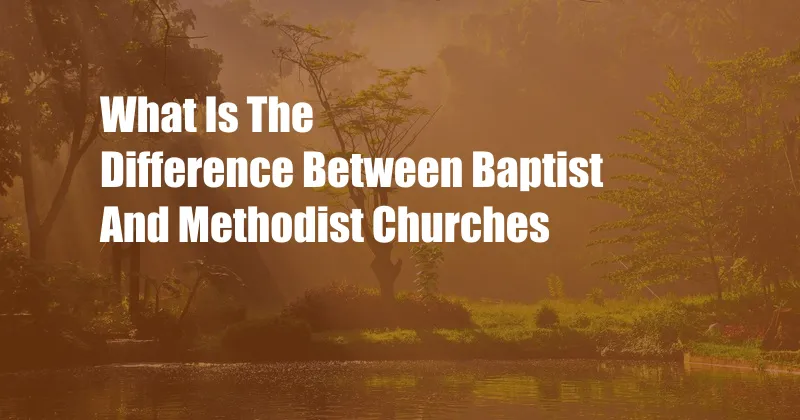
The Distinction Between Baptist and Methodist Churches
Growing up, I attended a Methodist church every Sunday. The church was a cornerstone of my community, a place where I felt a sense of belonging and spiritual connection. However, as I got older, I began to wonder about the differences between Methodist churches and other Christian denominations, particularly Baptist churches.
My curiosity led me on a journey of discovery, and I realized that despite their shared Christian beliefs, Baptist and Methodist churches have distinct histories, practices, and beliefs. In this article, I will explore the key differences between Baptist and Methodist churches, providing a comprehensive overview of their origins, doctrines, and traditions.
Baptist Churches: A Focus on Autonomy and Individualism
Origins and Beliefs
Baptist churches trace their roots back to the 16th-century Anabaptist movement, a group of radical Protestants who rejected infant baptism and emphasized the importance of personal conversion and believer’s baptism.
Baptists believe that each individual has a direct relationship with God and that the Bible is the sole authority for faith and practice. They emphasize the importance of local church autonomy, meaning that each congregation is self-governing and independent of external authority.
Practices and Traditions
Baptist churches typically have a congregational polity, where the congregation elects its own leaders and makes decisions regarding the church’s affairs. They also practice believer’s baptism, which involves immersing a person in water after they have made a personal profession of faith.
Baptists place a strong emphasis on personal testimony and the sharing of faith experiences. They often have revival meetings, where preachers encourage individuals to make a decision for Christ.
Methodist Churches: A Wesleyan Emphasis on Grace and Holiness
Origins and Beliefs
Methodist churches originated in the 18th century during the Wesleyan revival movement led by John Wesley, an Anglican priest. Wesley emphasized the importance of grace, holiness, and personal experience in the Christian life.
Methodists believe that salvation is a gift from God, received through faith in Jesus Christ. They emphasize the importance of living a holy life, pursuing spiritual growth, and engaging in good works.
Practices and Traditions
Methodist churches have a connectional polity, where local churches are linked together through regional and national conferences. They practice both infant and believer’s baptism.
Methodism is known for its emphasis on class meetings, small groups where members share their faith experiences and support one another in their spiritual growth. Methodists also have a strong tradition of evangelism and social activism, working to spread the gospel and make a positive impact on their communities.
Latest Trends and Developments
Both Baptist and Methodist churches have been adapting to changing societal and cultural trends in recent years.
Many Baptist churches are experiencing growth in megachurches, large churches with multiple campuses and thousands of members. Methodists, on the other hand, have faced some decline in membership in recent decades. However, they have been actively engaged in efforts to revitalize their churches and reach new generations.
Tips and Expert Advice for Navigating Church Differences
Choosing the right church for you depends on your personal beliefs, preferences, and spiritual needs. Here are some tips and expert advice to help you navigate the differences between Baptist and Methodist churches:
- Attend services at both types of churches to experience their worship styles and teachings firsthand.
- Talk to the pastors and members of each church to learn more about their beliefs and practices.
- Consider your own spiritual beliefs and values. Which church aligns best with your understanding of Christianity?
It’s important to remember that both Baptist and Methodist churches are part of the larger Christian community. Despite their differences, they share a common foundation of faith in Jesus Christ and a desire to serve God and their communities.
FAQ on Baptist and Methodist Churches
Q: What is the main difference between Baptist and Methodist churches?
A: The key difference lies in church governance and the emphasis on personal conversion and autonomy in Baptist churches versus the connectional polity and focus on grace and holiness in Methodist churches.
Q: Which type of church is more conservative?
A: Baptist churches tend to be more conservative in their interpretation of the Bible and social issues, while Methodist churches have a more progressive stance.
Q: Do Baptist and Methodist churches believe in the same sacraments?
A: Both denominations recognize baptism and communion as sacraments, but they differ in their practices and beliefs regarding these sacraments.
Q: Which denomination is larger?
A: Baptist churches have a larger number of congregations worldwide, while Methodist churches have a larger membership in the United States.
Conclusion
While Baptist and Methodist churches have distinct histories, practices, and beliefs, they are both rooted in the Christian faith and share a commitment to serving God and their communities. Understanding the differences between these denominations can help you make an informed decision about the right church for you.
Are you interested in learning more about the differences between Baptist and Methodist churches? Leave a comment below or reach out to a knowledgeable member of your community for further insights.